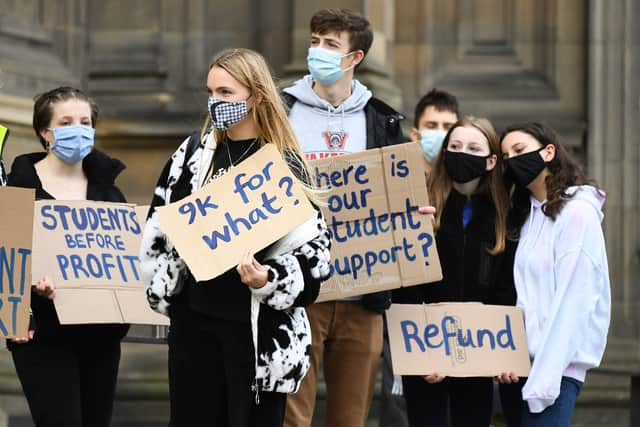Mental health at university: support during the pandemic and how current students are feeling
This article contains affiliate links. We may earn a small commission on items purchased through this article, but that does not affect our editorial judgement.
and live on Freeview channel 276
When Covid hit the UK back in early 2020, university students faced a series of challenges.
There were concerns around how lessons were going to be delivered, what would happen to their accommodation and whether it would impact exams.
Advertisement
Hide AdAdvertisement
Hide AdThe pandemic had a large effect on students’ mental health with one in four saying they felt lonely often or always, according to data released by the Office for National Statistics in March of this year.
Students across the country felt that throughout the lockdowns, universities had no regard for their mental health and wellbeing.
There was a wave of protests last October from students at several universities, including Warwick, Bristol, Glasgow and Manchester.
NationalWorld has spoken to students about their thoughts on university mental health support and the help and guidance offered throughout the pandemic.
What has support been like during the pandemic?
Advertisement
Hide AdAdvertisement
Hide AdStudents protested throughout the pandemic over a lack of support and resources available to them.
Last October, protesters held placards with messages such as “students before profit” and “9k for Zoom” with reports of some people being locked in their halls of residence unable to return to their family homes.


A graduate from Coventry University told NationalWorld: “I always felt like a number rather than a person.”
A survey carried out by the ONS between February and March 2021 found that 29% of students had considered leaving their course – and mental health was the most cited reason.
Advertisement
Hide AdAdvertisement
Hide AdIt also found that the proportion of undergraduate students saying that their course is good or very good value for money had dropped from 39% to 27% – the lowest levels recorded by the think tank.
One of the factors which caused the drop was a lack of in-person contact hours, something which has alienated students throughout the pandemic.
A recent graduate from the University of Manchester told NationalWorld that she felt the counselling services available to students were inadequate before the pandemic with very long lists and a lot of students not being seen to.
She also had very little contact time with academic advisers “never getting in touch.”
Advertisement
Hide AdAdvertisement
Hide AdWhile an Aston University graduate noticed that the focus on mental health “definitely increased” during the pandemic as the institution put in place more support mechanisms such as “mindfulness in our online lectures which really helped us.”
How are current students feeling?
Students returning to university will have a mix of face-to-face and remote learning as the height of lockdowns are behind us and we learn to ‘live’ with the virus.
A current undergraduate at Coventry University is facing more online learning and would like to see “more councillors and a space for students to go and speak to someone about their worries.”
“Definitely more support for students is needed,” she said.


Speaking to a final year undergraduate at Aston University, it seems those students who are set to have more blended learning are feeling “optimistic” about their next year of studies.
Advertisement
Hide AdAdvertisement
Hide AdThe university “has a specific email if they ever feel like they need someone to talk to,” they added.
Meanwhile a postgraduate at the University of Warwick told NationalWorld: “There has been no mention so far about mental health related services or resources.”
What universities said
Lisa Bayliss-Pratt, Coventry University’s Pro-Vice-Chancellor of the Faculty of Health and Life Sciences, said: “For a long time we’ve provided mental health support services through our student welfare environment and working very closely with the student’s union.”
Ms Bayliss-Pratt told NationalWorld the university has increased its online materials, physical activity opportunities and spirituality and holistic approaches to help students’ mental health. The university also “makes sure we are responsive through our welfare services.”
Advertisement
Hide AdAdvertisement
Hide Ad“We have 5 counsellors who are very busy across our Coventry campus”, she said.
The University of Manchester’s Director of Campus Life, Sarah Littlejohn, said the university “offers a wide range of support for students, covering the spectrum from preventative wellbeing resources through to support for students in crisis and experiencing significant mental health difficulties.”


“The mental health and wellbeing of our students is of central importance to The University of Manchester,” she added.
All the university’s schools “have a Student Support Team” and “offer extensive pastoral support round the clock” as well as “a 24/7 support phone line and app.”
Advertisement
Hide AdAdvertisement
Hide AdThe University of Warwick said they have many Wellbeing Support Services on offer to “help students to develop the personal resources and skills needed to navigate the challenges and opportunities of student life.”
The university shared its wellbeing portal which “will listen, help you and provide the support you need” and the newly developed five-session Wellbeing Programme called Steps to Wellbeing which aims “to equip our students to thrive whilst they study with us.”
NationalWorld approached Aston University for comments but the student services team did not have the capacity to respond.
If you’re struggling you can reach out to the YoungMinds text line by texting YM to 85258 for support from trained volunteers.
Advertisement
Hide AdAdvertisement
Hide AdAnyone can also contact Samaritans free at any time from any phone on 116 123, even a mobile without credit. This number won’t show up on your phone bill. Alternatively, you can visit the Samaritans website for more information.
A message from the editor:
Thank you for reading. NationalWorld is a new national news brand, produced by a team of journalists, editors, video producers and designers who live and work across the UK. Find out more about who’s who in the team, and our editorial values. We want to start a community among our readers, so please follow us on Facebook, Twitter and Instagram, and keep the conversation going. You can also sign up to our newsletters and get a curated selection of our best reads to your inbox every day.
Comment Guidelines
National World encourages reader discussion on our stories. User feedback, insights and back-and-forth exchanges add a rich layer of context to reporting. Please review our Community Guidelines before commenting.
